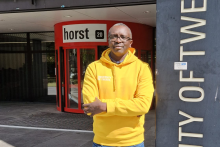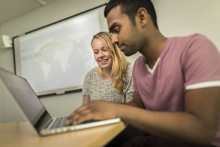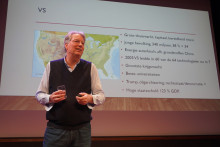How many students do you expect at the start of the programme in September?
'That is still difficult to say, because pre-enrollments are always a very dynamic process. The expected number based on our market analysis is 25 students. That would be a good starting point, although there could also be more. In any case, we notice sufficient enthusiasm. Humanitarian Engineering already existed as a minor at the UT and we also received positive reactions at study fairs. We're going to see how many students enroll.'
This programme is provided by three faculties: ET, BMS and ITC. How does that work exactly?
'It is one of the unique aspects of this master's programme. We focus on the development of underserved communities. For example, you can think of using plastic waste to make building materials, which very much involves the expertise of the ET faculty. But students also learn, for example, about helping to develop sustainable revenue models for the local communities – exactly something that BMS's business administration programmes emphasise.'
'Through the involvement of several faculties, you see a powerful combination emerging: students connect engineering skills with socio-cultural dynamics. We have also looked around for similar programmes, but they do not appear to exist in Europe. We can therefore say with some certainty that we are the first European programme in this field.'
What does the curriculum look like?
'The set-up is no different from other master's programmes: a two-year master's programme, with four modules per year of 15 ec each. The core of the programme revolves around challenge-based learning. We want to offer students relevant cases from practice. For example, Rik Stamhuis, a UT alumnus who currently has companies in Madagascar, was closely involved in setting up the programme. Among other things, he deals with access to renewable energy and clean cooking solutions for Malagasy people. It’s exactly these kinds of cases that students can work on.'
The run-up to the start of this master's programme had a bump: initially, the programme did not pass the test of the Higher Education Efficiency Committee. After that, recovery followed fairly quickly. How do you look back on that?
'Something went wrong in the process; we had commissioned a labour market survey, but the names of the companies where alumni could potentially work were not included in the report. We quickly rectified that in the new application – and we also received very positive feedback from education inspector NVAO on the accreditation later on. A run-up to starting a new study programme is a challenge in any case, but we’re ready to start.'
What still needs to be done before the start in September?
'We need to get the word out. That is why, for example, we are also going to park an ice cream truck on the O&O square on our own UT campus, so that we can gain awareness. It is also important that we expand our network in developing countries. The more good partners we bind to us, the better the cases we can offer and the more interesting the internships become.'
'Humanitarian Engineering' sounds like a programme that is somewhat altruistic in nature. Is it about offering help?
'I wouldn't call it offering help, that implies that it is one-way traffic. Empowerment sounds a bit better. In my opinion, the most important thing is that we work together with the underserved communities to come up with effective, intuitive and sustainable solutions to their problems. There is a kind of cross-pollination or two-way traffic in this: by thinking about the right solutions within their context together with the communities, we also develop ourselves as students and scientists. So it is certainly not that we are going to tell from a certain ivory tower how it should all be done. We learn from each other.'
Finally, what kind of 'type' of student do you want to train?
'It is precisely by closely involving the communities in the solutions they need that I think we can educate students who look at situations in a different way. So not that we only educate engineers on paper who are then faced with total surprises in the field, but professionals who – regardless of whether they become entrepreneurs themselves or work for a humanitarian organization or NGO, for example – can navigate the complexity of such a local context much better than with a more classically designed programme.'






